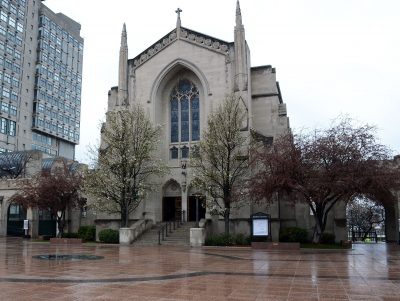
A Boston University alumna of the College of Communication journalism master’s program was unexpectedly required to pay thousands for a required summer internship while studying four years ago, according to the alumna herself.
Kristin Hugo’s story was initially told in an article by Vice titled “I Was Charged $6,000 to Be an Intern” published Thursday. The story explained that Hugo was unaware that receiving credit for the summer internship included in her program would come at a cost, and that cost would be higher than what she was told by BU.
Hugo was part of BU’s one-year science journalism program, which required a summer internship at the time. She told The Daily Free Press she completed her internship with National Geographic in the summer of 2016.
Hugo said she was not aware of the cost until she was already enrolled in the program, since it was not included in the website’s advertised price. After asking about the pricing, BU told her it would be “around $5,600,” Hugo wrote in an email.
“I appreciate that they answered my question quickly,” Hugo wrote. “I just think they should post their estimate — or better yet, the real numbers — directly on the website so that students can have that information before they decide whether or not to apply.”
Hugo said the required internship credit actually cost $5,928 and was not eligible for loans, but after she asked about deferment from the program, the university allowed her to use a $1,000 scholarship leftover from her fall and spring tuition, and granted an additional $3,000 merit scholarship.
Hugo said that she believes BU’s lack of transparency about cost is unacceptable.
“There is zero reason that it should be okay to just suddenly come up with a charge that was never written anywhere online, never emailed to us until we were already in the program,” Hugo said.
When Hugo asked advisors for more information about costs, they still did not give clear answers, she said.
“One of the advisors called me ‘nosy’ for asking too many questions,” Hugo said. “This is a program I’m paying thousands and thousands of dollars for. Can you just say yes or no?”
Hugo said that she doubts that the work done by BU faculty for her internship justifies the cost.
“I appreciate what they did do,” Hugo said, “but they emailed us a PDF. Is that worth $6,000?”
She also said she may have chosen a different program if she knew that the sticker price was not accurate.
“If all this information was available to me, then I would have price compared,” Hugo said. “Maybe I would have gone to BU, maybe not.”
Hugo also wrote in an email that she believes students need to advocate for themselves to get the best price.
“Get information from your peers, ask how much each person is paying,” she wrote. “Do it right now, start a group chat, make a google doc, waltz into the bar with your classmates and declare your scholarship package. Feeling awkward for five minutes could save you a decade of being in debt. If someone didn’t get a discount, ask financial services why.”
The accelerated graduate degree that Hugo was enrolled in has not accepted students for the last two admissions cycles. As of now, there are no plans to continue operation, according to William McKeen, chair of the journalism department.
McKeen wrote in an email that BU’s current master’s program for journalism does require an internship, but that it doesn’t necessarily have to be a summer internship in addition to fall and spring coursework.
“Our journalism graduate degree program does require an internship,” McKeen wrote, “but students take the credit in the fall semester, as part of their 20-hour load.”
Guillermo Creamer Jr., a co-founder of the intern advocacy organization Pay Our Interns, said universities need to understand that internships can be a financial burden for students.
“Employers need to pay their interns,” Creamer said, “but on the flip side, we also want to ensure that universities understand the financial burden that comes from paying for internship credit.”
Creamer also said that BU is not alone in charging students for their internships. Nationwide, universities charge internship fees.
“This is definitely not a one university issue. This is across the country,” Creamer said. “We’ve traveled to various states in different parts of the country. Time and time again, we’ve come across circumstances where we talked to the administration and have them understand that we will push employers to pay interns, but we also need the institution of admission to play a role.”
Ariane Vigna, a sophomore in the COM who had previously read the Vice article, said that she disagrees with BU charging Hugo for her internship credit.
“I think it’s kind of ridiculous,” Vigna said. “[Hugo was] not doing anything at BU. She was doing something in Washington. The university isn’t really providing her any kind of services.”
Aishwarya Ghogale, a first-year student in the Metropolitan College, said that she disagrees with the policy because internships are often off-campus and even outside Boston.
“In the tuition, [internship credit fees] shouldn’t be added,” Ghogale said. “Internships can be gotten anywhere.”
Laurren Henning, a sophomore in COM, said she disagrees with internships being unpaid in general.
“I think we’re in the worst wave of unpaid internships because the government isn’t really regulating it,” Henning said. “It’s making a lot of kids do some pretty ridiculous stuff for something that will look good on a resume.”




